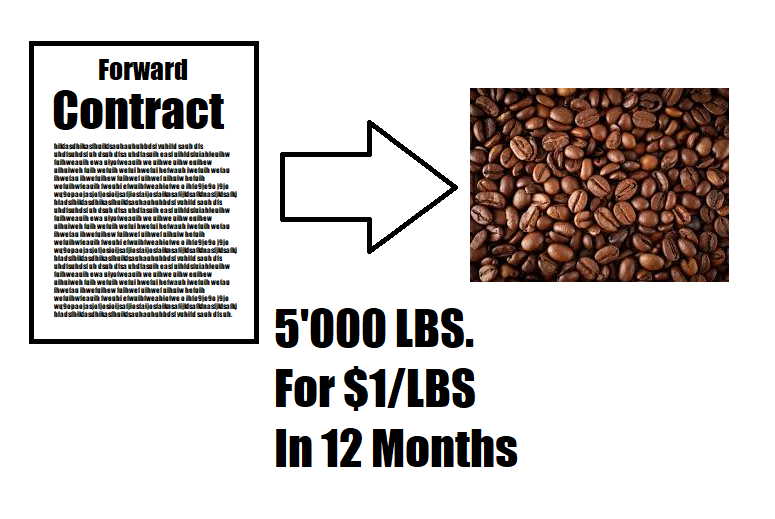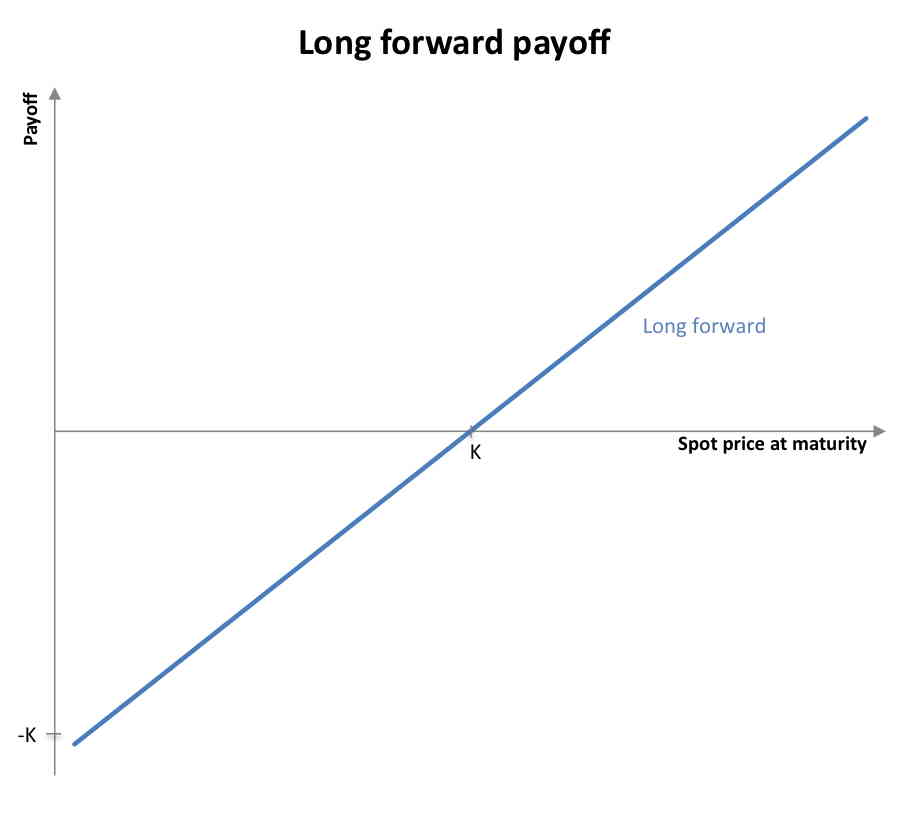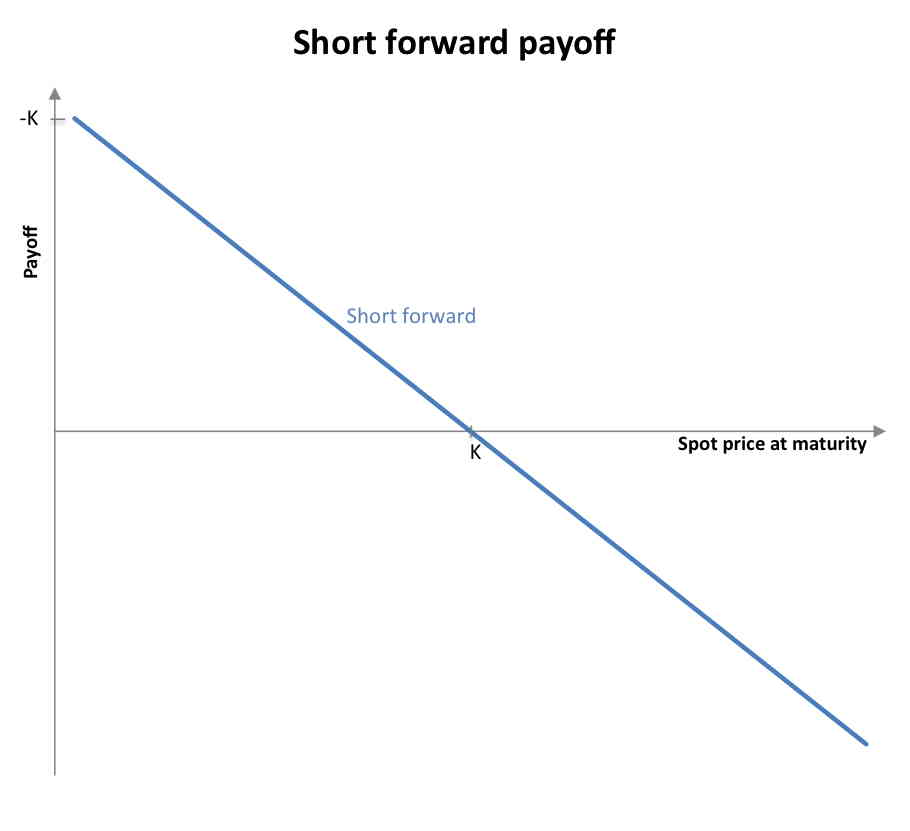Forwards are very often confused with futures or even options. Many people don’t really get the differences as all of these derivatives are similar. In this article I will sum up what a forward actually is and what distinguishes it from a future or an option contract.
What Are Forwards:
Forwards are an Over-The-Counter (OTC) derivative. This means that they are based on something (an underlying) which really can be anything. It can be a stock, a commodity, currency… Over-The-Counter means that forwards are something you deal with your broker directly and therefore aren’t actually involved in the markets.
Additionally, forwards are the predecessor of options. Thus forwards work very similar to options (and futures). Nevertheless, there are some added risks and other differences.
How Forwards Work, With An Example:

To open a forward position, you first of all need to select an underlying asset. Let’s pick stock ABC for this example. Afterwards, you’ll select an expiration date. We will choose an expiration
date that is 30 days away from now. Finally, you will have to choose a position size. For this example, we will go with one contract for simplicity’s sake. When opening a forward position, you agree to either deliver or accept shares of the underlying at the expiration date. If you buy (go long) a forward, you will have to buy shares of the underlying and if you sell (go short), you will have to sell shares on the expiration date at the underlying’s price when opening your forward position, no matter at what price the underlying will be.
That’s it. This is how you set up and open a forward position. You do not have to pay anything to open it. The profit and loss at expiry is calculated through the difference of the price of expiration and the price at the opening date. At expiration, you will have to live up to your agreement that you made when opening the forward position and either deliver or accept shares at the price when opening. The underlying’s price at the time of entry, can be regarded as a strike price. This will always be an At-The-Money (ATM) strike price and can not be changed.
Just like options you should theoretically always be allowed to close your position earlier. But if you keep it until the expiration date, you will be obliged to sell or buy shares at the “strike price”.
Payoff:


The payoff diagrams of forward contracts look very similar to those of a short and long stock position. The further the price moves in one direction, the higher the profit or loss becomes. If you look at the payoff profiles, forwards look more like stocks than like options or futures. Nevertheless, forwards do have quite a few similarities to options and futures as well:
Differences To Other Derivatives And Products:
Advantages:
The main advantage and reason why people/institutions trade forwards is that you do not have to deliver any money up front. This means that you can open a new forward position even if all your money is allocated and tied up. So if you want to speculate or buy something right now, but you can’t pay for it, because you don’t have any money at reach right now, you can still profit from prices with forward positions. Otherwise, forwards can be useful for non-speculators as well. An example of that would be a restaurant that is losing money from heavy price fluctuations in a commodity (like coffee). A forward contract would guarantee the commodity at a certain price and would thus eliminate the price fluctuations. In addition to that, many institutions use forwards as hedges. But probably the biggest advantage of forwards over other derivatives is that they are more customizable because they are OTC products instead of exchange traded. As forwards are Over-The-Counter (OTC) products that you make with your broker, you should be able to choose any time frame that fits you. Options for example, don’t allow this as they have expiration dates that can’t be changed. Lastly, forwards can have faster filling times than other derivatives because no counterparty has to be found as the broker already is the counterparty.

Forward Contract vs Option Contract:
An option works very similar to a forward contract. The main difference being that an option requires some premium to open. Forwards can be opened for nothing and do not require any premium to open. But on the other hand, both the buyer and the seller of a forward contract are obliged to deliver or accept the underlying asset at the agreed upon price. Options do not have to be exercised if the buyer doesn’t chooses to. If he chooses to, only the option seller would be obliged to deliver/accept shares of the underlying at the strike price. Therefore, options aren’t exercised to often either because the buyer isn’t interested in shares of the underlying or the option just isn’t In-The-Money (ITM).
Options have specific expiration dates. You can choose a date from many, but you can’t create fully custom expiration dates with options. This is possible with forwards. Nevertheless, options have more customizability when it comes to strike prices. Forwards have one strike price and that is the underlying’s trading price when opening the position (so ATM). Options on the other hand, have a huge variety of strike prices.
Forward vs Future Contract:

Futures and forwards are often confused with each other as these two really work very similar to each other. Just like with options and forwards, the main difference is that futures are exchange traded investment products and forwards are OTC products that can be negotiated with your broker. This also means that futures are standardized whereas forwards can be adapted much more to your needs.
Furthermore, forwards and futures have different settlements. Forwards have one settlement date which is the expiration date. Futures typically are settled day by day, meaning that you need much more money available than with forwards. Additionally, futures only rarely aren’t closed before expiration, so their underlying is delivered seldom. This is different with forward contracts.
Stocks vs Forwards:
Summed up, a forward contract is kind of a handicapped stock position with some advantages. The handicapped parts are that forwards have limited time meaning that can’t be held on for ever. There is one specific date where the contract expires and if the price is at the wrong place on that date, you will lose money. The main advantage on the other hand is that you do not require any capital to open the forward.
Risks:
- Theoretically, you could close a forward position any time before expiration (just like future or option positions). But practically this is quite difficult because firstly your forwards is customized to you, so not too many people will be interested in that and secondly the OTC forward marked isn’t near as liquid as the options or futures marked. In other words, you will likely not be able to close a forward position before the expiration date, meaning that you mostly have to deliver or accept shares of the underlying.
- If you can’t get out of your position whenever you want to, risk management can be much harder. You can’t really just cut your loss and close the position at a small loss.Your loss fully depends on the price of the underlying on the expiration date. You can’t manage this earlier on if you can’t close the position.
As forwards are Over-The-Counter derivatives, they do carry some additional OTC risks with them. These Risks are:
- Counterparty Risk: Counterparty risk is the risk that the second party in your trade can’t deliver/accept the promised shares for the certain price. This isn’t likely to happen, but it is not impossible either. If your broker goes under or just can’t pay, you won’t get your money. This is different with other derivatives like futures as these have clearing firms, guaranteeing you your money.
- Conflict Of Interest: All OTC products have this. As it mostly is your broker that takes the opposite position of yours he probably hopes that he will win, meaning that he hopes that you will lose. This is a conflict of interest because the broker usually should want the best for its clients and losing certainly isn’t that.
- (I have another article on CFDs (Contract For Difference) in which I discuss these problems much more thoroughly. To read it, click HERE!)
When To Trade Forwards And When Not To Trade Them:
Forwards can be quite versatile derivatives suitable for different scenarios. They can be used as hedges or as pure speculation. A forward could be a good choice if all your money is tied up and can’t be allocated, but you still want to speculate or profit from the current price in an underlying.
Additionally, forwards can be very useful for arbitrage strategies, but that is a topic for another article.
I wouldn’t really recommend forwards for private investors that want to speculate a little and aren’t interested in the underlying. Forward positions can be difficult to close before expiration and therefore it is highly likely that you will have to accept or deliver shares. If you don’t want this, options or futures are a better choice. These have fewer risks, are more liquid and don’t have to be exercised (options). It is much easier to close an option or future position before expiration as these are much more liquid.
Conclusion:
Forwards are a special kind of financial instrument that can come in handy in certain scenarios. Many bigger institutions use them, but their use in the retail trading industry has declined over the course of the years. They got replaced by other derivatives like options and futures. That is also the reason why very many retail brokers have even stopped offering forward contracts at all. They have a few advantages over other derivatives or stocks, but more risks do apply as well.
Just like always in trading, I do not recommend that you use forwards if you don’t exactly know what you are doing. Chances are that another investment product may be much better suited for that use. So don’t use forwards just for the sake of trying them out.
Before starting to trade any forwards, I recommend looking at options. Options can be more versatile, less risky and in general better suitable for the retail investor. Learn more about options and how you can make money with them in my 100% FREE Option Trading Education Center. Currently, I offer three free courses: Beginner, Intermediate and Advanced. Check them out HERE.

Wow, Louis ! I have been in the financial services industry for over 30 years and I had never heard of “forwards”. The concept seems fascinating ! Who offers them ? Do you find most full service brokers offer them ? Are they used for stocks only or also, commodities and/or currency trading ? Thanks for the education, Louis ! #Fascinating
Hey Rico,
The use of forwards has declined more and more in the retail trading industry. But some brokers still offer them even though many don’t advertise this as a big feature. The only broker offering them that I can think of straight away is easymarkets.
And forwards can be traded on practically anything (depends on broker), normally you should be able to trade them on stocks, commodities, currencies…
Hi Louis. Thanks for the education on Forwards. I found it very informative and has enlightened me in the pros and cons of trading Forwards, and explained how they differ from Stocks, Options and Futures. Very interesting to note in your ‘Conflict of Interest’ section that the broker wins if you lose. Certainly not what I want from my dealings with a broker. You give an example of a restaurant struggling because of heavy price fluctuations of coffee. Would this be a very dangerous situation at the end of the term if the price makes a big increase?
Thanks for your valuable insight into Forwards. Your web page is very professional and sets out in layman’s terms what can be a very difficult subject to understand.
The restaurant scenario was just one of many examples where institutions use forwards to eliminate price volatility. I’ll try to clarify it. Let’s say that a restaurant sells coffee for $2 per cup and they pay $1 to get the coffee necessary for 1 cup of coffee (I know that this is unrealistic). If the price of coffee would rise, the restaurant would have to pay more to get their coffee. This would mean that they earn less or maybe even no money if they don’t change the price of their coffee (from $2 to $3 or something similar). But restaurants or other institutions normally don’t want this. Therefore, they buy forwards. Forwards guarantee them their coffee at a certain price, so they don’t have to change their price for a cup of coffee. The other side of the forward agreement would be a coffee farmer. He agrees to this, because he also could lose money from coffee price volatility. Say for example coffee prices drop. This would lead to less earnings for the farmer. As you can see, both sides benefit from a forward contract.
This is one of many uses of forwards. I really hope this helps.
Forwards, futures and options are clearly explained. The differences are also brought out in a simple manner. However, it seems that Options are more versatile and less risky for the retail investor. A simple and informative website. I have gone through options beginner level and it has got me interested to go further.
I agree with you that options seem like a better choice for retail investors/traders. Therefore, I highly recommend my 100% free education on options. It really makes me happy to hear that you are enjoying the education.